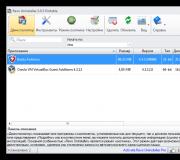Writing words in Latin letters online. Translation of Russian letters into English (online)
Enter the text in Russian letters:
Translate Clear
How to say in Latin letters:
Why translate Russian letters into Latin?
Since Russia is not yet a very rich country and most companies cannot afford to organize the distribution of free samples to advertise their products, at the moment most offers for freebies come from abroad.
Since the most common language is English, order forms for free samples are often in English.
The address information and full name of the recipient in such forms must be filled out in Latin. Since both our postmen and those companies that distribute freebies will understand the Latin alphabet.
If you write in Russian, then there is a risk that the organizers of the action simply will not want to spend time translating and understanding what is written there.
If you write in English, then our postmen will not understand who and where to deliver.
The best option is to write the freebie delivery address and the full name of the freebie recipient in Latin.
Now the Internet is full of different translators, but most of them are either not convenient or take a long time to search for.
We suggest constantly using our free translator of Russian text into Latin.
When you order freebies through forms written in English, write the delivery address and full name in Latin.
Our free, simple and convenient service will allow you to translate Russian text into Latin. When we order samples from foreign sites, we always do this and get a freebie, not always of course :-), but it comes. So the method is correct.
Why are SEO URLs with the correct transliteration so important for a website?
For competent, correct formation of the structure of a web resource, one of the main conditions is a unique CNC (human-readable URL). The appearance of the URL gives the user an idea of what is on the page, and tells the search robot what the format is, what the relevance to the request is, and so on. In a word, it provides information that is used in the algorithm for searching and displaying web pages. Thus, when specifying the resource address, you must use the Yandex translit.
Why choose translit from Yandex?
Yandex transliteration is different from the usual transliteration
When analyzing links, the Yandex search robot pays attention to site addresses. And here the URL written in transliteration plays an important role. It turns out that Yandex transliteration does not comply with traditional transliteration rules. There are exceptions to the translation of Cyrillic characters into Latin. For example, for Yandex the transcription of the letter “ш” differs from the generally accepted one - SHH instead of SHCH.
Translit Yandex URL and site ranking
SEO strategies necessarily take into account ranking algorithms. In this way, the webmaster achieves an improvement in the position of the web resource in search results. The right URLs increase your chances of getting closer to the top positions in the SERP. The search engine ranks pages with the correct transliterated address higher. Consequently, an Internet resource where the correct transliteration of Yandex is observed receives an advantage over its competitors.
Yandex has also integrated a useful bonus into the search for sites that use competent transliteration - highlighting of the transliterated address. This highlighting is a powerful tool for attracting resource visitors and increasing the conversion rate of the site as a whole.
What type of CNC should you choose?
Transliteration or translation into English, Cyrillic?
The following three translation options are available on the site:
- Competent translit according to Yandex rules. Ideal for Yandex, but not suitable for Google. Google will not highlight these words in the results.
- Manually translating a word into English. Unfortunately, such links are useless for Yandex, but are a priority for Google.
- Using URL writing in Cyrillic. Minus - external non-anchor links will look like this http://domain.ru/%D1%82%D1%80%D0%B5%D0.
The conclusion is clear: to create a CNC website on the Internet under Yandex, we use the online translit service. For Google, we simply take the translation of the word into English.
Every language has such a category of words as proper names: first names, surnames, all kinds of names. Each of us has at least once been faced with the need not to translate, namely write Russian word in English. For example, when we are dealing with names, surnames, names of cities, streets, and various establishments (such as cafes, restaurants, hotels), we need to convey the sound of the word and make it readable in English. The names of cultural and religious events, names of holidays, national elements that are not in English-speaking culture also require transmission in English, because we communicate about these things with foreigners, talk about our country and culture.
There are rules for this purpose transliterations - a method of writing words of one language using the means of another. Each letter of the Russian alphabet (Cyrillic alphabet) has a corresponding English letter (Latin alphabet) or a combination of letters.
There are many transliteration systems and standards. But first, let's talk about transliteration standards. Now that almost everyone has a foreign passport, when we travel abroad and fill out documents and forms in English, it is simply necessary to know the rules of transliteration that are accepted in the world.
Below are options for transliteration of letters and combinations of the Russian alphabet:
|
Russian letters |
English letters and combinations |
The soft sign and the hard sign are not conveyed in writing. Some letters are represented by combinations of two letters, and the letter Ш - by a combination of four: shch.
For example:
Surname Shcherbakov will be written Shcherbakov.
Vowels E And Yo transliterated as YE if they appear at the beginning of a word or after a vowel:
Yezhov
Yezhikov
Sergeyev
In the Russian language, letter combinations are often found Y with vowels, and each of the combinations has a correspondence:
|
Russian combinations |
English combinations |
Many countries have transliteration rules for international passports. In Russia, for example, the following rules apply for foreign passports:
A-A, B-B, B-V, G-G, D-D, E-E, E-E, F-ZH, Z-Z, I-I, J-I, K-K, L- L, M-M, N-N, O-O, P-P, R-R, C-S, T-T, U-U, F-F, X-KH, C-TC, Ch-CH, Sh-SH, Shch-SHCH, Y-Y, E-E, Yu-IU, I-IA.
Transliteration of first and last names for international passports occurs according to this standard using a special program into which your data is entered in Russian. If you have a foreign passport, you must use the spelling of your first and last name that is presented in the document.
Transliteration is used not only when preparing documents. We have already mentioned groups of words for which we use transliteration. For example, in English texts it is easy to find the words borshch, pelmeni, matryoshka, Perestroyka and many others that have no equivalent in English.
Or perhaps you remember the times when mobile phones did not support the Russian language, and we exchanged SMS messages in English. At the same time, everyone intuitively invented their own rules of transliteration. Reading these messages was not easy, but very funny. For example, to transmit a letter AND used the letters G, J, Z, ZH. With letter Y It was generally difficult: it was written as I, U, Y, JI. Those days are long gone, but the need to master the transliteration system has not disappeared, but, on the contrary, has increased. Use the knowledge you have gained and communicate in English fluently. Good luck to you!
Subscribe to our communities at
When working at a computer, there are times when we come across a transliterated text, i.e. with writing words of the Russian language (Cyrillic) in Latin letters.
For example, if we find ourselves abroad or in some Internet cafe, etc., and the computer we want to use does not have a Russian keyboard layout, then in such cases it becomes quite difficult to type Russian text.
In such situations, a transliterator (abbreviated as translit, or Cyrillic converter) can be helpful. The principle of transliteration is simple - by pressing keys with Latin letters, we get the Cyrillic alphabet.
Or this situation: for example, we live in Russia, we speak and write in Russian, and we have an operating system on our computer that supports Russian fonts. But our friend or acquaintance lives “abroad” and there are no Russian fonts on his computer, so he cannot write to us in Russian.
He knows Russian, but he simply cannot type text in Russian on his computer, so he uses transliteration and writes Russian text in Latin letters.
And usually in such cases we can get a message that might look something like this:
Hello Max! Write tebe v translite, potomu chto u menya na komp’yutere net russkih shriftov.
If we know Latin letters, we can easily understand what is written in the message:
Hello Max! How are you? I’m writing to you in transliteration because I don’t have Russian fonts on my computer.
But if we receive a similar message written in transliteration that is much larger in volume, then quickly reading a large text becomes more difficult. Therefore, in such a situation, a transliterator can also help, quickly translating this message into Cyrillic.
There are various online services and programs that perform text transliteration. Let us first pay attention to three online text transliterations, from simple to more advanced.
Translit online - to translit and from translit to Cyrillic
If we just need to translate the text into transliteration, or we have received a transliterated message and it needs to be translated into Cyrillic, i.e. into Russian, then we can use, for example, a simple service: .
We translate the text into transliteration:

We translate the text from translit into Cyrillic:

All that remains is to select the text and, by right-clicking, select Copy for further use of the selected text.
You can also use another service for transliterating text: translit translator online.
This is the same as in the previous service described, only here a button has been added To buffer, which corresponds to the action of selecting and copying text. This service also provides a virtual keyboard for typing:

An even more advanced service for text transliteration: Translit.
This service was specially developed for Russian-speaking residents of the CIS countries who are abroad and want to correspond in their native language. And this service has even more possibilities than the previous ones.
There is no particular need to describe it in detail in this article, since there is also help on its use with a clear description:

Although I would still like to mention some interesting features of this service.
For example, those who are proficient on a computer can use a virtual Russified keyboard and touch-type in Russian even on computers that do not support the Russian language.
Translit service It can also translate words into other languages (although I personally prefer to use it), look up the meaning of words in dictionaries, and several other useful functions.
There is also a mobile version of the translit here: http://translit.ru/classic/ for working in browsers of phones, smartphones, as well as computers on which the browser does not support JavaScript:

Program for translation from translit into Russian and back
There are also various programs that transliterate text, but since novice users in most cases do not often have to deal with transliteration, therefore I will not focus on the programs for now.
But if someone still needs a transliterator program, then you can, for example, use the NI Transliterator program, trying to figure it out yourself (if you are asked to prepare instructions for installing and using this program, I will take note).
On Hvastika they often ask how to correctly write the address on, and in other foreign online stores. So we decided to help and made a small service. You enter your address in Russian, and the service does the transliteration for you. All you have to do is check the resulting address and copy it into the appropriate fields in the store.
The data is not saved anywhere. Questions and wishes - write in the comments. I would like to say thank you - LIKE!
Fill out the form
Javascript is disabled in your browser. Unfortunately, you will not be able to use this form.
How to write the address on foreign stores
In principle, for any store to send a parcel, it is enough to indicate the recipient’s country and zip code. Because this data is enough for the parcel to reach our customs. Therefore, in private correspondence, you can indicate the country's address in English and the postcode in numbers, and the recipient's address (city, street, etc.) in Russian. This is even more convenient for our mail. It is more convenient for a postman to read an address in Russian than to parse a crooked transliteration.
However, this will not work with stores. In most cases they cannot print the address in Cyrillic. Their computer simply may not have the appropriate encoding and they will simply see an address written in Cyrillic as crappy ones. Therefore, the address has to be translated. In this case, you do not need to write the address in accordance with foreign rules. No need to write all sorts of street, apartment, P.O.Box, etc. The post office may not understand such an address. Write your address as usual, but in Latin letters.
If you have a foreign passport, then it is better to always write the names of streets, cities or regions as written there.
Our service doesn't do anything special. It simply helps you transliterate your address, that is, write Russian letters in English. That's it.
Attention! Be sure to check your address before submitting it. We do not accept any responsibility for address errors (although we try to avoid them).



